Welcome to DU!
The truly grassroots left-of-center political community where regular people, not algorithms, drive the discussions and set the standards.
Join the community:
Create a free account
Support DU (and get rid of ads!):
Become a Star Member
Latest Breaking News
General Discussion
The DU Lounge
All Forums
Issue Forums
Culture Forums
Alliance Forums
Region Forums
Support Forums
Help & Search
Celerity
Celerity's Journal
Celerity's Journal
January 29, 2024

https://feps-europe.eu/publication/progressive-yearbook-2024/
With its fifth edition, the Progressive Yearbook can be considered an established and thriving tradition, through which FEPS wishes to mark and reflect on the most important events and developments of the previous year, and try to imagine what the future has in store for us.
In this new volume, we prepare ourselves for a year of pivotal elections. Above all, for us Europeans, the upcoming elections of the European Parliament (EP). They will be a crucial moment because, given the widespread idea that it is high time for the EU to give a new boost to integration, the political balance within the new EP will also define what kind of Europe we will shape.
Reform of the EU Treaty, the process of enlargement, and the twin transitions, green and digital, remain high among European priorities, which is reflected in the chapters of the Yearbook. For progressives, they are also intimately connected with the need to promote social justice.
As usual, we also look beyond European borders, reflect on international developments and trends that are creating an increasingly multipolar world, and consider the opportunities for reforming global governance and implementing the sustainable development goals.
Last, but not least, we address the tragic events in the Middle East, where yet another war, triggered this time by a horrific terrorist attack and by the appalling Israeli retaliation, calls for an enhanced international role for the EU to help bring peace to that tormented land.
This yearly edition counts on renowned authors’ contributions, including academics, politicians, and civil society representatives.
Read the Progressive Yearbook 2024!
Find here the different chapters!
Table of content
Foreword. In it for the long run
LOOKING BACK
European Chronology 2023
European Progressive Observatory 2023
Revamping Europe By László Andor
PROGRESS IN EUROPE
The progressive doctrine for European integration: It is not only the EU that needs a convention… By Ania Skrzypek
The European Green Deal in the age of volatility By Mathieu Blondeel
Progressive Person of the Year László Andor interviews Teresa Ribera Rodríguez
BIG ISSUES
The age of digital democracy: A progressive vision for generative AI. By Fabian Ferrari
Tax the rich! By Paul Magnette et al.
Culture and its capital role. By Miquel Iceta I Llorens
EU free trade agreements: Outlook and the way forward. By Marek Belka And Michał Kapa
NATIONAL FOCUS
Finland: Testing times ahead for the opposition under new party leadership. By Tapio Raunio
Belgium: The political system at a crossroad. By Pascal Delwit
GLOBAL FOCUS
UN Summit of the Future: A unique opportunity in a generation. By Maria João Rodrigues
Sustainable development goals and the way forward. By Udo Bullmann
BRICS to BRICS+: From development ambition to geopolitical challenge. By Uwe Optenhögel
We need courage to bring peace to the Middle East. László Andor interviews Yossi Beilin
PREDICTIONS
The future of EU social policy: Depth or breadth? By Caroline de la Porte
The future of work. By Giles Merritt
Young people’s expectations from European politics. By Sofie Amalie Stage
The Paris 2024 Olympic Games: An archetype of the politicisation of major international sporting events. By David Roizen
Joe Biden’s balancing act. By Francesco Ronchi
ASEAN and the EU: Malaysia’s active neutrality to forge transregional partnerships for peace and prosperity. By Howard Lee
BIOGRAPHIES
Progressive Yearbook 2024 - free e-book

https://feps-europe.eu/publication/progressive-yearbook-2024/
With its fifth edition, the Progressive Yearbook can be considered an established and thriving tradition, through which FEPS wishes to mark and reflect on the most important events and developments of the previous year, and try to imagine what the future has in store for us.
In this new volume, we prepare ourselves for a year of pivotal elections. Above all, for us Europeans, the upcoming elections of the European Parliament (EP). They will be a crucial moment because, given the widespread idea that it is high time for the EU to give a new boost to integration, the political balance within the new EP will also define what kind of Europe we will shape.
Reform of the EU Treaty, the process of enlargement, and the twin transitions, green and digital, remain high among European priorities, which is reflected in the chapters of the Yearbook. For progressives, they are also intimately connected with the need to promote social justice.
As usual, we also look beyond European borders, reflect on international developments and trends that are creating an increasingly multipolar world, and consider the opportunities for reforming global governance and implementing the sustainable development goals.
Last, but not least, we address the tragic events in the Middle East, where yet another war, triggered this time by a horrific terrorist attack and by the appalling Israeli retaliation, calls for an enhanced international role for the EU to help bring peace to that tormented land.
This yearly edition counts on renowned authors’ contributions, including academics, politicians, and civil society representatives.
Read the Progressive Yearbook 2024!
Find here the different chapters!
Table of content
Foreword. In it for the long run
LOOKING BACK
European Chronology 2023
European Progressive Observatory 2023
Revamping Europe By László Andor
PROGRESS IN EUROPE
The progressive doctrine for European integration: It is not only the EU that needs a convention… By Ania Skrzypek
The European Green Deal in the age of volatility By Mathieu Blondeel
Progressive Person of the Year László Andor interviews Teresa Ribera Rodríguez
BIG ISSUES
The age of digital democracy: A progressive vision for generative AI. By Fabian Ferrari
Tax the rich! By Paul Magnette et al.
Culture and its capital role. By Miquel Iceta I Llorens
EU free trade agreements: Outlook and the way forward. By Marek Belka And Michał Kapa
NATIONAL FOCUS
Finland: Testing times ahead for the opposition under new party leadership. By Tapio Raunio
Belgium: The political system at a crossroad. By Pascal Delwit
GLOBAL FOCUS
UN Summit of the Future: A unique opportunity in a generation. By Maria João Rodrigues
Sustainable development goals and the way forward. By Udo Bullmann
BRICS to BRICS+: From development ambition to geopolitical challenge. By Uwe Optenhögel
We need courage to bring peace to the Middle East. László Andor interviews Yossi Beilin
PREDICTIONS
The future of EU social policy: Depth or breadth? By Caroline de la Porte
The future of work. By Giles Merritt
Young people’s expectations from European politics. By Sofie Amalie Stage
The Paris 2024 Olympic Games: An archetype of the politicisation of major international sporting events. By David Roizen
Joe Biden’s balancing act. By Francesco Ronchi
ASEAN and the EU: Malaysia’s active neutrality to forge transregional partnerships for peace and prosperity. By Howard Lee
BIOGRAPHIES
January 29, 2024

https://www.washingtonpost.com/opinions/2024/01/29/judges-maga-lawlessness/
https://archive.is/B6XOH

A distinguishing characteristic of MAGA Republicans is their contempt for the rule of law. Not to be bound by election results, the Constitution or court processes, four-time-indicted former president Donald Trump sets the tone. He declares himself immune from prosecution. He defies judicial gag orders, throws temper tantrums in court and tosses around “executive privilege” like confetti. Thankfully, judges have begun responding to MAGA lawlessness and attempts to nullify federal law.
U.S. District Judge Royce C. Lamberth, for example, in an otherwise routine sentencing memo for Jan. 6, 2021, participant James Little, castigated election deniers and Jan. 6 apologists. “The Court is accustomed to defendants who refuse to accept that they did anything wrong,” he wrote. “But in my thirty-seven years on the bench, I cannot recall a time when such meritless justifications of criminal activity have gone mainstream.”
Although Lamberth did not specify MAGA adherents, he condemned “distortions and outright falsehoods [that] seep into the public consciousness.” He continued: “I have been shocked to watch some public figures try to rewrite history, claiming rioters behaved ‘in an orderly fashion’ like ordinary tourists, or martyrizing convicted January 6 defendants as ‘political prisoners’ or even, incredibly, ‘hostages.’” (The latter came from the lips of MAGA flunkies, including Rep. Elise Stefanik of New York, a contender for vice president on Trump’s ticket.) Lamberth added that though such claims are “preposterous,” he fears that “such destructive, misguided rhetoric could presage further danger to our country.”
Lamberth concluded:

He conceded that his opinion wouldn’t stop the flood of lies, but he expressed hope that “a little truth will go a long way.” His extraordinary admonition (akin to former federal judge J. Michael Luttig identifying Trump and his supporters as a “clear and present danger”) speaks to the severity of the MAGA movement’s attack on the rule of law.
snip
Jennifer Rubin: Judges rebuke lawless MAGA Republicans. We need more of the same.

https://www.washingtonpost.com/opinions/2024/01/29/judges-maga-lawlessness/
https://archive.is/B6XOH

A distinguishing characteristic of MAGA Republicans is their contempt for the rule of law. Not to be bound by election results, the Constitution or court processes, four-time-indicted former president Donald Trump sets the tone. He declares himself immune from prosecution. He defies judicial gag orders, throws temper tantrums in court and tosses around “executive privilege” like confetti. Thankfully, judges have begun responding to MAGA lawlessness and attempts to nullify federal law.
U.S. District Judge Royce C. Lamberth, for example, in an otherwise routine sentencing memo for Jan. 6, 2021, participant James Little, castigated election deniers and Jan. 6 apologists. “The Court is accustomed to defendants who refuse to accept that they did anything wrong,” he wrote. “But in my thirty-seven years on the bench, I cannot recall a time when such meritless justifications of criminal activity have gone mainstream.”
Although Lamberth did not specify MAGA adherents, he condemned “distortions and outright falsehoods [that] seep into the public consciousness.” He continued: “I have been shocked to watch some public figures try to rewrite history, claiming rioters behaved ‘in an orderly fashion’ like ordinary tourists, or martyrizing convicted January 6 defendants as ‘political prisoners’ or even, incredibly, ‘hostages.’” (The latter came from the lips of MAGA flunkies, including Rep. Elise Stefanik of New York, a contender for vice president on Trump’s ticket.) Lamberth added that though such claims are “preposterous,” he fears that “such destructive, misguided rhetoric could presage further danger to our country.”
Lamberth concluded:

He conceded that his opinion wouldn’t stop the flood of lies, but he expressed hope that “a little truth will go a long way.” His extraordinary admonition (akin to former federal judge J. Michael Luttig identifying Trump and his supporters as a “clear and present danger”) speaks to the severity of the MAGA movement’s attack on the rule of law.
snip
January 29, 2024

Those with seats at the table of the international financial institutions, Jayati Ghosh writes, cling to their power.
https://www.socialeurope.eu/can-the-imf-and-the-world-bank-really-be-changed

That was then: a commemorative plaque in the Mount Washington Hotel, Bretton Woods
As the Bretton Woods institutions complete 80 years of existence—since they were agreed upon at an allies’ conference on a postwar financial and monetary order in the New Hampshire town—some stocktaking is inevitable. This is however a rather depressing exercise. The international financial institutions, the International Monetary Fund and what came to be known as the World Bank, were created in a buzz of optimism about the potential for international economic co-operation as the second world war was coming to a close. But their functioning has fallen far short of what the architects of the system then would have hoped. In their first decade, both institutions were heavily focused on lending for reconstruction. Thereafter, when lower-income countries did start receiving funds, the conditionalities associated with the loans—heavily oriented towards ‘fiscal discipline’, expressed as austerity and privatisation of public goods and services—became highly controversial and very often did not deliver the desired outcomes. Through the debt crises of the developing world in the 1980s and 90s, the IMF effectively became the debt collector, enforcing programmes designed to benefit (or even save) the creditor banks based in the global north.
So well-known was this pattern that by the early part of this century, most lower-income countries had opted for self-insurance, holding excess foreign-exchange reserves to avoid having to approach the IMF. The institution was in decline, with few client countries, and increasingly irrelevant. It was, ironically, saved by the Global Financial Crisis, when G20 countries decided to use the IMF as the conduit for rescue funds. Thereafter, the eurozone crisis became yet another opportunity for the IMF to provide very large (and controversial) loans—and since then it has been very much back in business. The underlying politics of the choice of recipients and the varying amounts of loans offered have unfortunately become even more evident. A record loan of (ultimately) $57 billion was offered in 2018 to the then president of Argentina, Mauricio Macri, because of his closeness to the United States president, Donald Trump, and his willingness to engage in blatantly neoliberal policies. That loan was so poorly designed that it was associated with massive outflows of private capital, so that in a few years Argentina was back in a debt crisis, with Macri’s successor having to clean up the mess.
Fit for purpose?
The deeply geopolitical nature of the operations and the problems with the programmes are not the only reasons why the revival of the IMF as the supposed financial stabiliser of the global economy is problematic. There is a real question about whether the IMF and the World Bank are fit for purpose in a global economy which has changed dramatically. During those eight decades, there has been a transformation in the relative sizes and significance of national economies while, among other trends, private financial flows have risen markedly. The institutions now betray major inadequacies in their organisation and functioning. The sharply increasing economic and ecological inequalities across the world are thereby accentuated, creating social and political tensions and geopolitical conflicts which are ever more intense. Humanity faces common challenges which require global public investment on a large scale. But the IMF and the World Bank are too slow, unwieldy and (let’s admit) miserly in their responses, exacerbating rather than assuaging these problems.
Some of this is because of the outdated governance of both institutions. Quotas and voting rights are skewed heavily in favour of a few rich economies with a small minority of the world’s people. This is now even more difficult to justify, given those states’ diminished shares of global output and world trade, which obviously affects their credibility and legitimacy. The ‘gentlemen’s conventions’ on the leadership of these institutions—an American at the head of the World Bank, a European at the head of the IMF—can no longer be justified at all. More open, transparent and democratic processes must be introduced for choosing the leadership. The IMF’s executive board should be expanded to ensure more representation from global-majority countries, especially from Africa. For important decisions, a double-majority voting mechanism would ensure that decisions had the support of principal shareholders as well as the majority. There should also be a general increase in quotas and shares to reflect the changed contours of the global economy.
snip
Can the IMF and the World Bank really be changed?

Those with seats at the table of the international financial institutions, Jayati Ghosh writes, cling to their power.
https://www.socialeurope.eu/can-the-imf-and-the-world-bank-really-be-changed

That was then: a commemorative plaque in the Mount Washington Hotel, Bretton Woods
As the Bretton Woods institutions complete 80 years of existence—since they were agreed upon at an allies’ conference on a postwar financial and monetary order in the New Hampshire town—some stocktaking is inevitable. This is however a rather depressing exercise. The international financial institutions, the International Monetary Fund and what came to be known as the World Bank, were created in a buzz of optimism about the potential for international economic co-operation as the second world war was coming to a close. But their functioning has fallen far short of what the architects of the system then would have hoped. In their first decade, both institutions were heavily focused on lending for reconstruction. Thereafter, when lower-income countries did start receiving funds, the conditionalities associated with the loans—heavily oriented towards ‘fiscal discipline’, expressed as austerity and privatisation of public goods and services—became highly controversial and very often did not deliver the desired outcomes. Through the debt crises of the developing world in the 1980s and 90s, the IMF effectively became the debt collector, enforcing programmes designed to benefit (or even save) the creditor banks based in the global north.
So well-known was this pattern that by the early part of this century, most lower-income countries had opted for self-insurance, holding excess foreign-exchange reserves to avoid having to approach the IMF. The institution was in decline, with few client countries, and increasingly irrelevant. It was, ironically, saved by the Global Financial Crisis, when G20 countries decided to use the IMF as the conduit for rescue funds. Thereafter, the eurozone crisis became yet another opportunity for the IMF to provide very large (and controversial) loans—and since then it has been very much back in business. The underlying politics of the choice of recipients and the varying amounts of loans offered have unfortunately become even more evident. A record loan of (ultimately) $57 billion was offered in 2018 to the then president of Argentina, Mauricio Macri, because of his closeness to the United States president, Donald Trump, and his willingness to engage in blatantly neoliberal policies. That loan was so poorly designed that it was associated with massive outflows of private capital, so that in a few years Argentina was back in a debt crisis, with Macri’s successor having to clean up the mess.
Fit for purpose?
The deeply geopolitical nature of the operations and the problems with the programmes are not the only reasons why the revival of the IMF as the supposed financial stabiliser of the global economy is problematic. There is a real question about whether the IMF and the World Bank are fit for purpose in a global economy which has changed dramatically. During those eight decades, there has been a transformation in the relative sizes and significance of national economies while, among other trends, private financial flows have risen markedly. The institutions now betray major inadequacies in their organisation and functioning. The sharply increasing economic and ecological inequalities across the world are thereby accentuated, creating social and political tensions and geopolitical conflicts which are ever more intense. Humanity faces common challenges which require global public investment on a large scale. But the IMF and the World Bank are too slow, unwieldy and (let’s admit) miserly in their responses, exacerbating rather than assuaging these problems.
Some of this is because of the outdated governance of both institutions. Quotas and voting rights are skewed heavily in favour of a few rich economies with a small minority of the world’s people. This is now even more difficult to justify, given those states’ diminished shares of global output and world trade, which obviously affects their credibility and legitimacy. The ‘gentlemen’s conventions’ on the leadership of these institutions—an American at the head of the World Bank, a European at the head of the IMF—can no longer be justified at all. More open, transparent and democratic processes must be introduced for choosing the leadership. The IMF’s executive board should be expanded to ensure more representation from global-majority countries, especially from Africa. For important decisions, a double-majority voting mechanism would ensure that decisions had the support of principal shareholders as well as the majority. There should also be a general increase in quotas and shares to reflect the changed contours of the global economy.
snip
January 29, 2024

https://prospect.org/health/2024-01-26-massachusetts-hospital-nightmare-steward-health/

Residents at Steward Health Care’s Carney Hospital in Dorchester, Massachusetts, called the graduate medical education accreditation agency to have the failing program shut down.
The group of fresh medical school grads knew something wasn’t right with Steward Health Care when they showed up in Dorchester, Massachusetts to start their residencies in Carney Hospital’s inaugural family medicine residency class during the summer of 2014 and learned the president who had recruited them had already been fired. Soon afterward, a Steward administrator admitted the new family medicine clinic and the pediatric ward they had toured on their recruitment visit were never actually opening, and that the nearby hospital at which residents were supposed to learn how to deliver babies was being shuttered entirely. Shortly after that, they showed up to work to learn their program director had been fired. Ultimately, the residents decided to call the graduate medical accreditation agency and get the program shut down.
“It was all smoke and mirrors...they had no intention of giving us any of the resources we needed to learn what we needed to learn or do a good job,” remembers a preventative medicine physician and former Carney medical resident, recalling an afternoon when a patient had a heart attack and she had to Google “how to operate an EKG machine” because she could not find a single nurse or technician in the building to help her. “It’s hard to convey how much of a crisis it felt like as a first-year resident,” another former Carney resident, family physician Stephanie Arnold, wrote in an essay for the Prospect last year about her experiences working for private equity owned health care providers.
It was not the first or last time Steward has been accused of making big, empty promises. In 2011, they promised the urologists of Brockton they were building a prostate cancer “center of excellence” at Good Samaritan Hospital: That never happened, though Steward apparently upgraded the ICU’s wiring, which we know because they allegedly skipped out on paying the contractor who did the job. In 2017, Steward told the government of Malta that it would turn the Mediterranean micro-state’s three aging hospitals into a hub for medical tourism, but instead they spent the 400 million euros they got for the job on … a lot of lawyers; an appeals court judge last fall called the contract a “simulation” designed “to draft contracts intended not to deliver quality medical service, but other things.” And in 2019, Steward promised the community of West Monroe, Louisiana, that Glenwood Regional Medical Center would become a leader in a “groundbreaking” new form of cardiac surgery; last fall, the state health department threatened to shut down the hospital after an inspection revealed it was so behind on its water, sewer, and utility bills its hot water had been cut off. State Rep. Mike Echols, who represents northern Louisiana and used to operate a large physician practice in the state, described Steward to the Prospect as “one of those corporate terrorists who come in and loot the ship and drain it dry.”
Indeed. Yesterday, Steward announced it would be closing a hospital it owns in Texas at 7 a.m. next Friday. Its New England Sinai Hospital is shutting soon after that. The company has hired the restructuring adviser AlixPartners, which is often a precursor to a Chapter 11 filing. Physicians say that few of its 30-some hospitals are in shape to survive. Carney Hospital has long been nicknamed “Carnage,” and a group of Steward hospitals formerly named Wuesthoff Health System are still widely known within their northeastern Florida community as “Worst Off.”
snip
Massachusetts Wakes Up to a Hospital Nightmare

https://prospect.org/health/2024-01-26-massachusetts-hospital-nightmare-steward-health/

Residents at Steward Health Care’s Carney Hospital in Dorchester, Massachusetts, called the graduate medical education accreditation agency to have the failing program shut down.
The group of fresh medical school grads knew something wasn’t right with Steward Health Care when they showed up in Dorchester, Massachusetts to start their residencies in Carney Hospital’s inaugural family medicine residency class during the summer of 2014 and learned the president who had recruited them had already been fired. Soon afterward, a Steward administrator admitted the new family medicine clinic and the pediatric ward they had toured on their recruitment visit were never actually opening, and that the nearby hospital at which residents were supposed to learn how to deliver babies was being shuttered entirely. Shortly after that, they showed up to work to learn their program director had been fired. Ultimately, the residents decided to call the graduate medical accreditation agency and get the program shut down.
“It was all smoke and mirrors...they had no intention of giving us any of the resources we needed to learn what we needed to learn or do a good job,” remembers a preventative medicine physician and former Carney medical resident, recalling an afternoon when a patient had a heart attack and she had to Google “how to operate an EKG machine” because she could not find a single nurse or technician in the building to help her. “It’s hard to convey how much of a crisis it felt like as a first-year resident,” another former Carney resident, family physician Stephanie Arnold, wrote in an essay for the Prospect last year about her experiences working for private equity owned health care providers.
It was not the first or last time Steward has been accused of making big, empty promises. In 2011, they promised the urologists of Brockton they were building a prostate cancer “center of excellence” at Good Samaritan Hospital: That never happened, though Steward apparently upgraded the ICU’s wiring, which we know because they allegedly skipped out on paying the contractor who did the job. In 2017, Steward told the government of Malta that it would turn the Mediterranean micro-state’s three aging hospitals into a hub for medical tourism, but instead they spent the 400 million euros they got for the job on … a lot of lawyers; an appeals court judge last fall called the contract a “simulation” designed “to draft contracts intended not to deliver quality medical service, but other things.” And in 2019, Steward promised the community of West Monroe, Louisiana, that Glenwood Regional Medical Center would become a leader in a “groundbreaking” new form of cardiac surgery; last fall, the state health department threatened to shut down the hospital after an inspection revealed it was so behind on its water, sewer, and utility bills its hot water had been cut off. State Rep. Mike Echols, who represents northern Louisiana and used to operate a large physician practice in the state, described Steward to the Prospect as “one of those corporate terrorists who come in and loot the ship and drain it dry.”
Indeed. Yesterday, Steward announced it would be closing a hospital it owns in Texas at 7 a.m. next Friday. Its New England Sinai Hospital is shutting soon after that. The company has hired the restructuring adviser AlixPartners, which is often a precursor to a Chapter 11 filing. Physicians say that few of its 30-some hospitals are in shape to survive. Carney Hospital has long been nicknamed “Carnage,” and a group of Steward hospitals formerly named Wuesthoff Health System are still widely known within their northeastern Florida community as “Worst Off.”
snip
January 29, 2024
https://www.thelocal.se/20240126/swedish-prime-minister-wont-negotiate-with-hungary-on-nato-bid
https://archive.is/L7DdW

Hungarian Prime Minister Viktor Orban this week invited Kristersson to Budapest to discuss the issue "at your earliest convenience", an invitation Kristersson on Thursday accepted. "I'm happy to go to Budapest ... We have a lot to talk about ... but we're not negotiating the Nato membership, there are no negotiations on this," Kristersson told Swedish television TV4. "But we could talk about how we will best cooperate in Nato," he said.
Swedish Foreign Minister Tobias Billström on Tuesday said there was "no reason to negotiate" with Hungary. Kristersson said Friday that while he was willing to travel to Budapest, a meeting with Orban at the European Union Council in Brussels on February 1st was more practical. "We'll see each other on Thursday next week at the European Council and we can begin discussing things then," he said. For a visit to Budapest, "we'd have to find a date for this, things like this aren't usually done in haste. I suspect that his calendar, like mine, is quite full."
Orban's invitation came just days after Hungary criticised Sweden for not taking steps to strengthen bilateral relations. Budapest has often denounced what it called Sweden's "openly hostile attitude", accusing Swedish representatives of being "repeatedly keen to bash Hungary" on rule-of-law issues. Orban said nonetheless on Wednesday that he had reaffirmed his "support" for Sweden's membership to the security alliance in a phone call with Nato chief Jens Stoltenberg.
Sweden and Finland dropped decades of military non-alignment and applied for Nato membership in response to Russia's invasion of Ukraine nearly two years ago. Finland became the 31st nation of the alliance last April. Nato membership applications require unanimous ratifications by all alliance members. After more than a year of delays, Turkey's parliament ratified Sweden's bid on Tuesday and President President Recep Tayyip Erdogan signed the formal accession protocol on Thursday.
snip
Swedish Prime Minister 'won't negotiate' with Hungary on Nato bid
Swedish Prime Minister Ulf Kristersson said he would be happy to accept his Hungarian counterpart Viktor Orban's invitation to Budapest to discuss a range of issues, but not to negotiate the terms of Sweden's Nato application.https://www.thelocal.se/20240126/swedish-prime-minister-wont-negotiate-with-hungary-on-nato-bid
https://archive.is/L7DdW

Hungarian Prime Minister Viktor Orban this week invited Kristersson to Budapest to discuss the issue "at your earliest convenience", an invitation Kristersson on Thursday accepted. "I'm happy to go to Budapest ... We have a lot to talk about ... but we're not negotiating the Nato membership, there are no negotiations on this," Kristersson told Swedish television TV4. "But we could talk about how we will best cooperate in Nato," he said.
Swedish Foreign Minister Tobias Billström on Tuesday said there was "no reason to negotiate" with Hungary. Kristersson said Friday that while he was willing to travel to Budapest, a meeting with Orban at the European Union Council in Brussels on February 1st was more practical. "We'll see each other on Thursday next week at the European Council and we can begin discussing things then," he said. For a visit to Budapest, "we'd have to find a date for this, things like this aren't usually done in haste. I suspect that his calendar, like mine, is quite full."
Orban's invitation came just days after Hungary criticised Sweden for not taking steps to strengthen bilateral relations. Budapest has often denounced what it called Sweden's "openly hostile attitude", accusing Swedish representatives of being "repeatedly keen to bash Hungary" on rule-of-law issues. Orban said nonetheless on Wednesday that he had reaffirmed his "support" for Sweden's membership to the security alliance in a phone call with Nato chief Jens Stoltenberg.
Sweden and Finland dropped decades of military non-alignment and applied for Nato membership in response to Russia's invasion of Ukraine nearly two years ago. Finland became the 31st nation of the alliance last April. Nato membership applications require unanimous ratifications by all alliance members. After more than a year of delays, Turkey's parliament ratified Sweden's bid on Tuesday and President President Recep Tayyip Erdogan signed the formal accession protocol on Thursday.
snip
January 28, 2024
Most Gen Z Americans, particularly Gen Z Democrats, are more likely than older Americans to believe that generational change in political leadership is necessary to solve the country’s problems...................
snip
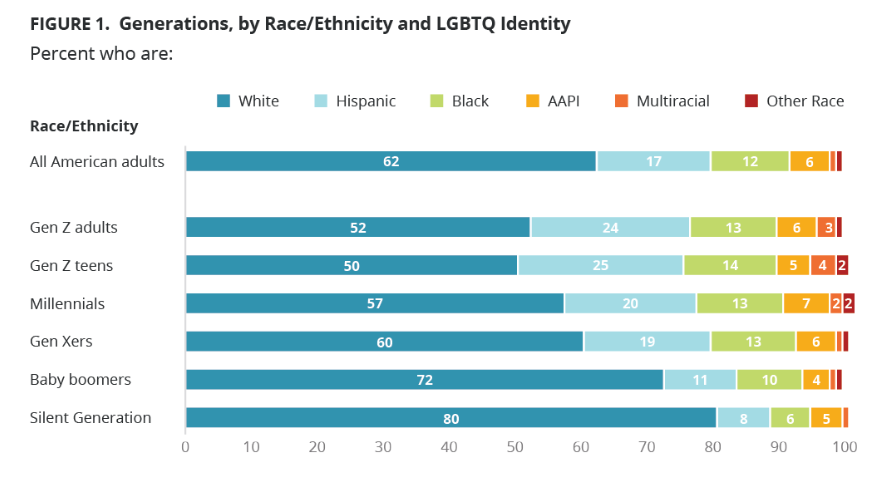
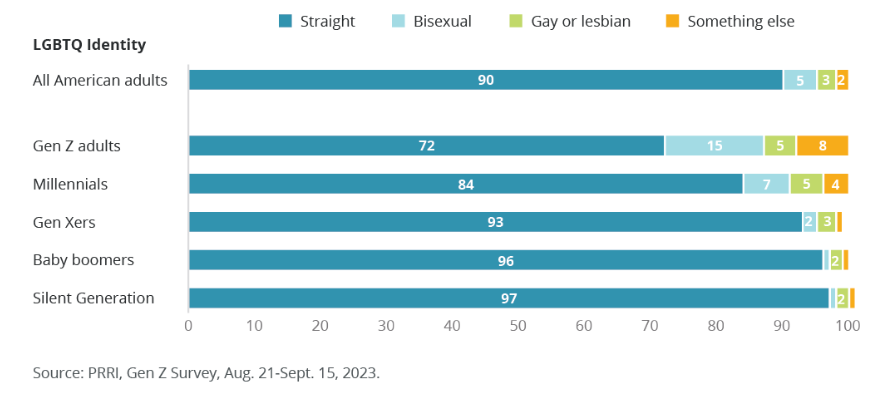
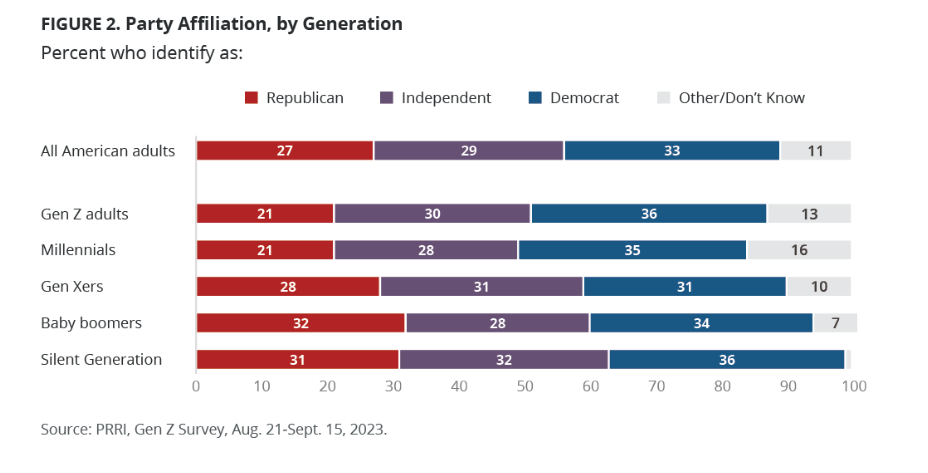
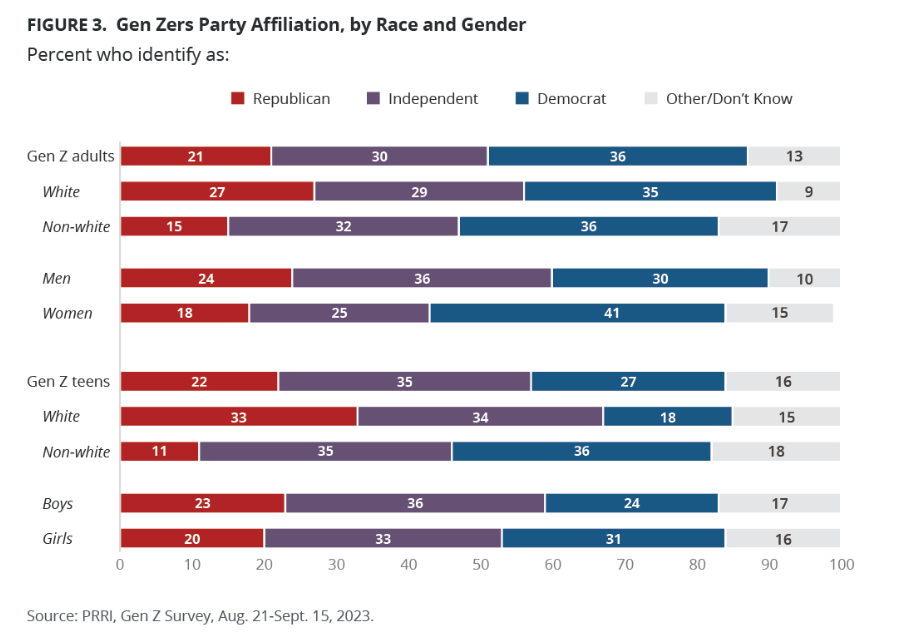
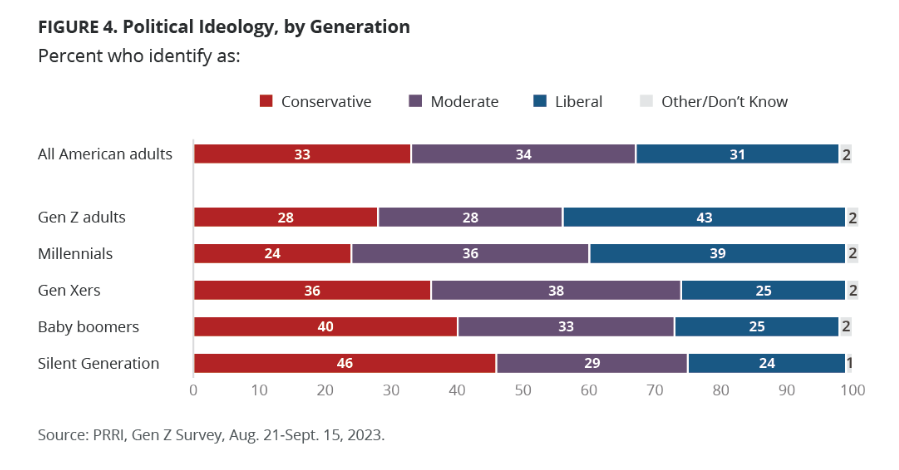
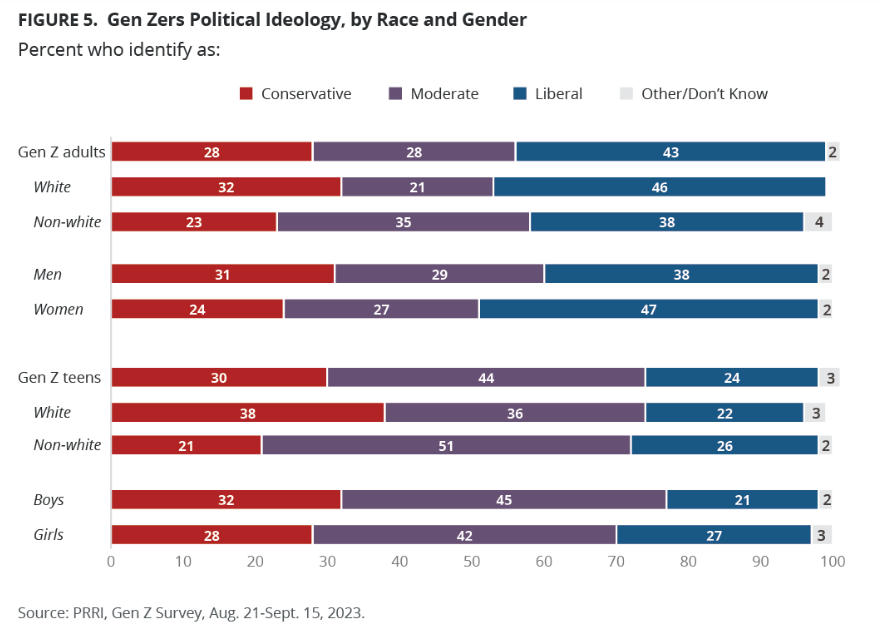

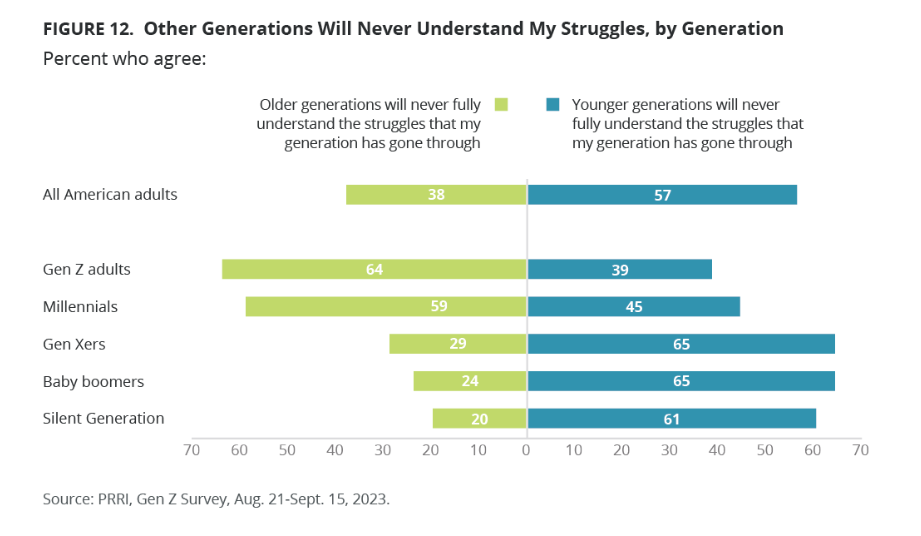

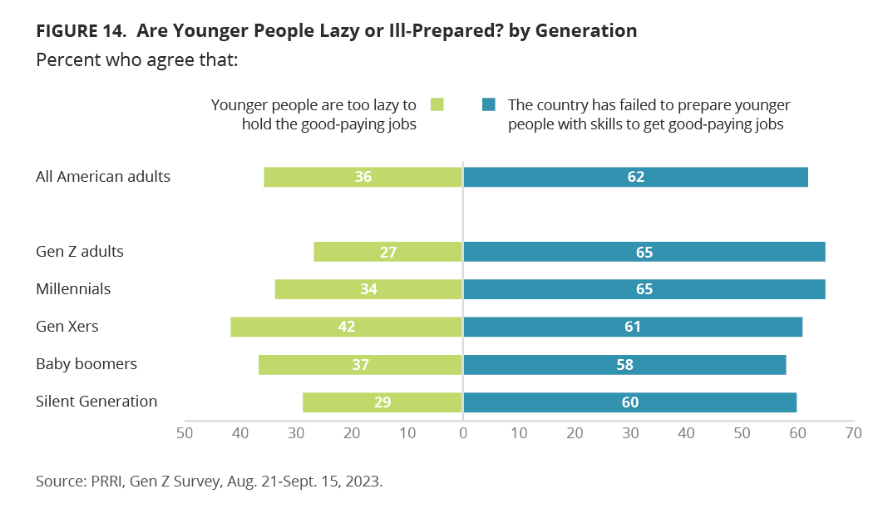
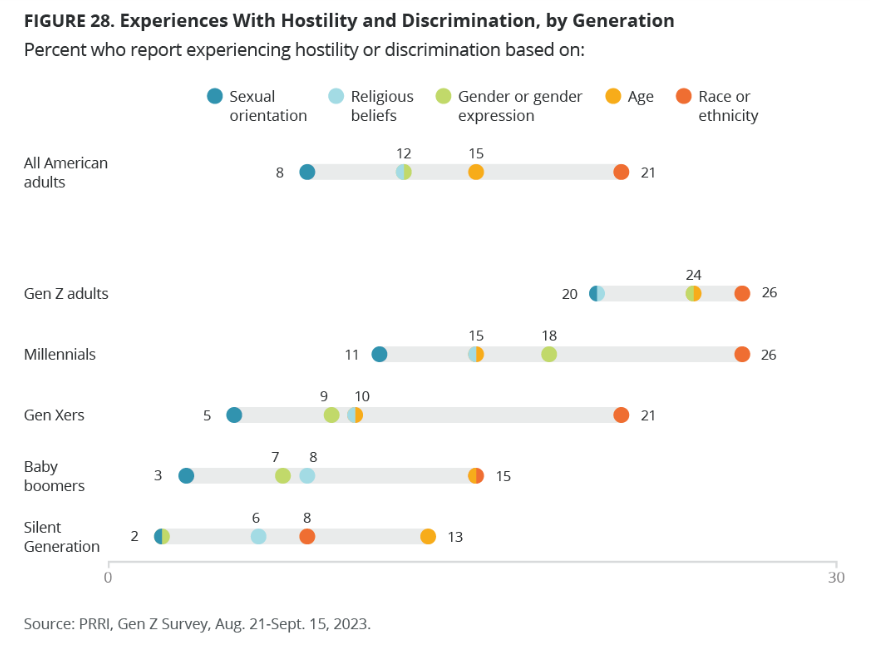
much much more at the top link
A Political/Cultural Glimpse Into America's Future: Generation Z's Views on Generational Change & the Challenges Ahead
https://www.prri.org/research/generation-zs-views-on-generational-change-and-the-challenges-and-opportunities-ahead-a-political-and-cultural-glimpse-into-americas-future/Executive Summary
Members of Generation Z are coming into their own politically, socially, and culturally, bringing their values and viewpoints to their communities and workplaces, and to our nation’s political system. In addition to being the most racially and ethnically diverse generation in our nation’s history, Gen Z adults also identify as LGBTQ at much higher rates than older Americans. Like millennials, Gen Zers are also less likely than older generations to affiliate with an established religion. This report considers what sets members of Generation Z apart from older generations in terms of their political and cultural values, their faith in communities and political institutions, and their views on religion and the importance of diversity and inclusion in the nation’s democracy. The report is based on both the results of a national survey of all Americans, which includes oversamples of Generation Z — both Gen Z adults (ages 18–25) and Gen Z teens (13–17) — and on an analysis of ten virtual focus groups that included a wide cross section of Gen Z adults from across the United States.
Members of Generation Z are coming into their own politically, socially, and culturally, bringing their values and viewpoints to their communities and workplaces, and to our nation’s political system. In addition to being the most racially and ethnically diverse generation in our nation’s history, Gen Z adults also identify as LGBTQ at much higher rates than older Americans. Like millennials, Gen Zers are also less likely than older generations to affiliate with an established religion. This report considers what sets members of Generation Z apart from older generations in terms of their political and cultural values, their faith in communities and political institutions, and their views on religion and the importance of diversity and inclusion in the nation’s democracy. The report is based on both the results of a national survey of all Americans, which includes oversamples of Generation Z — both Gen Z adults (ages 18–25) and Gen Z teens (13–17) — and on an analysis of ten virtual focus groups that included a wide cross section of Gen Z adults from across the United States.
Gen Z adults trend slightly less Republican than older Americans. More than half of Gen Z teens do not identify with a major party, but most share their parents’ party affiliation.
Gen Z adults (21%) are less likely than all generational groups except millennials (21%) to identify as Republican. Meanwhile, 36% of Gen Z adults identify as Democrats, and this rate is similar to other generations, with the exception of Gen Xers, who are less Democratic (31%). More than half of Gen Z teens (51%) do not identify with either major political party, compared with 43% of Gen Z adults. Most Gen Z teens share the same partisan identity as their parents.
Gen Z adults (21%) are less likely than all generational groups except millennials (21%) to identify as Republican. Meanwhile, 36% of Gen Z adults identify as Democrats, and this rate is similar to other generations, with the exception of Gen Xers, who are less Democratic (31%). More than half of Gen Z teens (51%) do not identify with either major political party, compared with 43% of Gen Z adults. Most Gen Z teens share the same partisan identity as their parents.
Gen Z adults are more liberal than older Americans. Gen Z teens are more moderate.
With the exception of millennials (24%), Gen Z adults (28%) are notably less likely than other generational cohorts to identify as conservative. And Gen Z adults (43%) identify as liberal at a higher rate than other generations. A plurality of Gen Z teens (44%) identify as moderate. While Gen Z women are substantially more liberal than Gen Z men (47% vs. 38%), that gender gap is smaller among Gen Z teens, with 27% of teen girls and 21% of teen boys identifying as liberal. By contrast, white teens are more likely to identify as conservative (38%) than non-white teens (21%).
With the exception of millennials (24%), Gen Z adults (28%) are notably less likely than other generational cohorts to identify as conservative. And Gen Z adults (43%) identify as liberal at a higher rate than other generations. A plurality of Gen Z teens (44%) identify as moderate. While Gen Z women are substantially more liberal than Gen Z men (47% vs. 38%), that gender gap is smaller among Gen Z teens, with 27% of teen girls and 21% of teen boys identifying as liberal. By contrast, white teens are more likely to identify as conservative (38%) than non-white teens (21%).
Gen Z is more religiously diverse than older generations. Gen Z teens mirror their parents’ religious affiliation. Gen Z teens are more likely than Gen Z adults to attend church or find religion important.
Gen Z adults are notably less likely to identify as white Christians and more likely to identify as religiously unaffiliated than older generations, with the exception of millennials. More than eight in ten white Christian Gen Z teens (83%) and Christian Gen Z teens of color (85%) report belonging to the same religion as their parents, compared with 68% of religiously unaffiliated teens. Gen Z Republicans—both adults and teens—attend church more often, express that religion is more important to them, and have higher trust in organized religion than Gen Z Democrats or independents.
Gen Z adults are notably less likely to identify as white Christians and more likely to identify as religiously unaffiliated than older generations, with the exception of millennials. More than eight in ten white Christian Gen Z teens (83%) and Christian Gen Z teens of color (85%) report belonging to the same religion as their parents, compared with 68% of religiously unaffiliated teens. Gen Z Republicans—both adults and teens—attend church more often, express that religion is more important to them, and have higher trust in organized religion than Gen Z Democrats or independents.
Most Gen Z Americans, particularly Gen Z Democrats, are more likely than older Americans to believe that generational change in political leadership is necessary to solve the country’s problems...................
snip











much much more at the top link
January 28, 2024
Inner Chords is a tried and true deep house mix with songs from 1993 to 2005. Tracks that contain but aren't exclusive to ethereal vocals, deep chords, groovy basslines, jazzy improvisation, and soulfulness beyond measure permeate the whole mix and will have you headbobbing into the wee hours of the morning. The mix is intended for a night in solo or with friends accompanied by something to wind down the night with: a bowl (or two) and/or a glass of wine.
After discovering that some of my favorite house records came from the 90s and early 2000s, I spent the last few months searching the depths of the internet for the best tracks I could find that pertained to distinct sounds I had always wanted to play. Something about these tracks' rawness, swing, and overall lack of polish that I couldn't get enough of.
The result of that labor of love includes this mix. Many people inspired these mixes but few pushed me to newer bounds of music more than Chaos in the CBD, Ian Pooley, The Groove Boys Project, and of course, my brother Kevin.
Made with love. Hope you enjoy.
If you wish to download the mix, check out my Ko-fi page: https://ko-fi.com/chrissedayao
Tracklist:
flim flam - yellow sox
Get down - to-ka
Vuelva a casa - halo, dj chus & david
Golem - alone (the last one)
Meditate on this - jump cutz
Sync you (remix) - kino-moderno
My love (solar remix) - physics
True to yourself (big moses remix) - dihann moore
Atmosfear’s vibe - playin’ 4 the city
Vermeille - pepe bradock
Sessions one - toka project
Coming back - turbulent
I know i can make it (mix 2) - montana heights
Remember me - boobjazz
no time - toka project
time changes - little green men
summer now - inland knights
got to go there - trevor loveys
after the rain (reel dub) - rosie gaines
latino bump - house of 909
tall stories (ian pooley’s lars from mars mix)
don’t cry - toka project
I got it - doug willis
back to me - 6th borough project
you are we - crazy p
Old School Deep House Mix (1993-2005)
Inner Chords is a tried and true deep house mix with songs from 1993 to 2005. Tracks that contain but aren't exclusive to ethereal vocals, deep chords, groovy basslines, jazzy improvisation, and soulfulness beyond measure permeate the whole mix and will have you headbobbing into the wee hours of the morning. The mix is intended for a night in solo or with friends accompanied by something to wind down the night with: a bowl (or two) and/or a glass of wine.
After discovering that some of my favorite house records came from the 90s and early 2000s, I spent the last few months searching the depths of the internet for the best tracks I could find that pertained to distinct sounds I had always wanted to play. Something about these tracks' rawness, swing, and overall lack of polish that I couldn't get enough of.
The result of that labor of love includes this mix. Many people inspired these mixes but few pushed me to newer bounds of music more than Chaos in the CBD, Ian Pooley, The Groove Boys Project, and of course, my brother Kevin.
Made with love. Hope you enjoy.
If you wish to download the mix, check out my Ko-fi page: https://ko-fi.com/chrissedayao
Tracklist:
flim flam - yellow sox
Get down - to-ka
Vuelva a casa - halo, dj chus & david
Golem - alone (the last one)
Meditate on this - jump cutz
Sync you (remix) - kino-moderno
My love (solar remix) - physics
True to yourself (big moses remix) - dihann moore
Atmosfear’s vibe - playin’ 4 the city
Vermeille - pepe bradock
Sessions one - toka project
Coming back - turbulent
I know i can make it (mix 2) - montana heights
Remember me - boobjazz
no time - toka project
time changes - little green men
summer now - inland knights
got to go there - trevor loveys
after the rain (reel dub) - rosie gaines
latino bump - house of 909
tall stories (ian pooley’s lars from mars mix)
don’t cry - toka project
I got it - doug willis
back to me - 6th borough project
you are we - crazy p
January 28, 2024
Groove Armada - Paper Romance (Doorly Remix)
Groove Armada - Paper Romance (Zombie Disco Squad Remix)
Groove Armada - Paper Romance (Urchins Remix)
Label: Cooking Vinyl – GABLDLS3APROMO
Format: CD, Single, Promo
Country: UK
Released: Jan 2010
Genre: Electronic, Rock
Style: New Wave, Electro, Dubstep, House



Groove Armada - Paper Romance (Remix EP 1) 2010
Groove Armada - Paper Romance (Album Version)Groove Armada - Paper Romance (Doorly Remix)
Groove Armada - Paper Romance (Zombie Disco Squad Remix)
Groove Armada - Paper Romance (Urchins Remix)
Label: Cooking Vinyl – GABLDLS3APROMO
Format: CD, Single, Promo
Country: UK
Released: Jan 2010
Genre: Electronic, Rock
Style: New Wave, Electro, Dubstep, House



January 27, 2024

Senators hope to release the legislative text of the bill next week, but it faces stiff odds in the Republican-led House
https://www.washingtonpost.com/politics/2024/01/26/biden-vows-shut-down-an-overwhelmed-border-if-senate-deal-passes/
https://archive.is/Bsh9Y

President Biden said Friday that he would use new emergency authorities to “shut down the border when it becomes overwhelmed” if Congress passes a bipartisan immigration plan that the Senate has been negotiating. The comments signified a remarkable shift in tone for a Democratic president and underscored the urgency of the issue for his reelection campaign as immigration remains one of his most vexing political and policy challenges.
In a lengthy statement Friday, Biden praised the bipartisan border deal senators have been negotiating, calling it “the toughest and fairest set of reforms to secure the border we’ve ever had in our country.” “It would give me, as President, a new emergency authority to shut down the border when it becomes overwhelmed,” he said. “And if given that authority, I would use it the day I sign the bill into law.”
Biden is referencing a new expulsion authority senators have negotiated that would kick in on days unauthorized border crossings reach 5,000 over a five-day average, according to two people familiar with the outlines of the deal who spoke on the condition of anonymity to discuss private deliberations. That authority would shut down most asylum screenings for migrants crossing illegally. Migrants could still apply at ports of entry, where a set number of asylum claims would need to be granted, they said. Migrants would be expelled indefinitely until crossings dipped below 3,750 per day, which would end the expulsion authority period.
The deal also changes the U.S. asylum process with the goal of reducing the average time for an asylum claim to be resolved from several years to 6 months, the people said. It also raises the standard for migrants to be able to make an asylum claim in the first place. Some Republicans’ goal to dramatically curtail Biden’s use of his humanitarian parole powers for certain categories of migrants is not in the final deal, they said. Senators said they hope to release the legislative text of the deal next week.
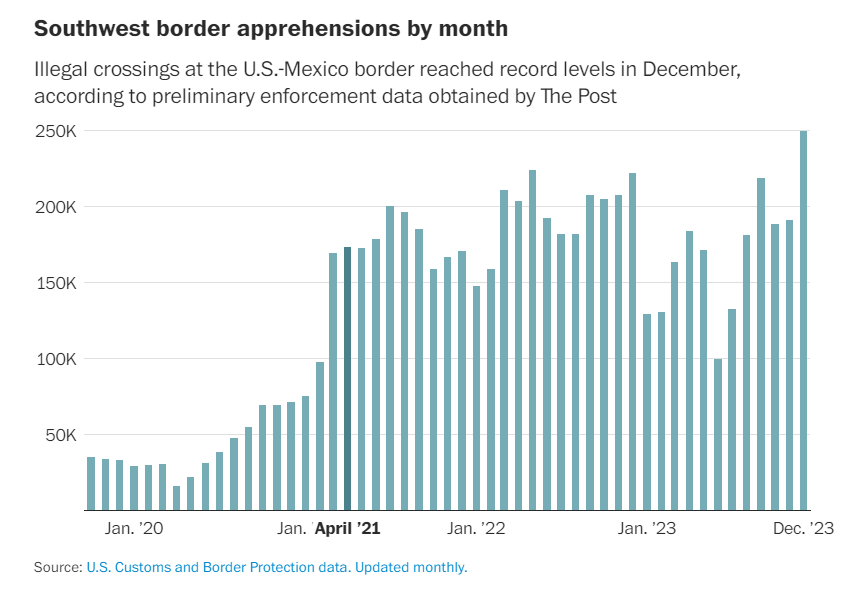
snip
Biden vows to 'shut down' an overwhelmed border if Senate deal passes

Senators hope to release the legislative text of the bill next week, but it faces stiff odds in the Republican-led House
https://www.washingtonpost.com/politics/2024/01/26/biden-vows-shut-down-an-overwhelmed-border-if-senate-deal-passes/
https://archive.is/Bsh9Y

President Biden said Friday that he would use new emergency authorities to “shut down the border when it becomes overwhelmed” if Congress passes a bipartisan immigration plan that the Senate has been negotiating. The comments signified a remarkable shift in tone for a Democratic president and underscored the urgency of the issue for his reelection campaign as immigration remains one of his most vexing political and policy challenges.
In a lengthy statement Friday, Biden praised the bipartisan border deal senators have been negotiating, calling it “the toughest and fairest set of reforms to secure the border we’ve ever had in our country.” “It would give me, as President, a new emergency authority to shut down the border when it becomes overwhelmed,” he said. “And if given that authority, I would use it the day I sign the bill into law.”
Biden is referencing a new expulsion authority senators have negotiated that would kick in on days unauthorized border crossings reach 5,000 over a five-day average, according to two people familiar with the outlines of the deal who spoke on the condition of anonymity to discuss private deliberations. That authority would shut down most asylum screenings for migrants crossing illegally. Migrants could still apply at ports of entry, where a set number of asylum claims would need to be granted, they said. Migrants would be expelled indefinitely until crossings dipped below 3,750 per day, which would end the expulsion authority period.
The deal also changes the U.S. asylum process with the goal of reducing the average time for an asylum claim to be resolved from several years to 6 months, the people said. It also raises the standard for migrants to be able to make an asylum claim in the first place. Some Republicans’ goal to dramatically curtail Biden’s use of his humanitarian parole powers for certain categories of migrants is not in the final deal, they said. Senators said they hope to release the legislative text of the deal next week.

snip
January 27, 2024

Behind the Kremlin façade of a grateful people devoted to their leader lie despair, paranoia, intolerance, rage and violence.
https://www.socialeurope.eu/preparing-russia-for-permanent-war

Father of the nation: one of the official photos of Putin distributed by the Russian presidential press office
In the late 18th century, Catherine the Great planned a tour of Crimea, which her court favorite, Count Grigory Potemkin, had conquered a few years earlier. But while Potemkin had managed to seize the agriculturally rich peninsula from the Ottoman empire, he had failed to achieve the promised colonisation. To save face, Potemkin ordered the construction of a row of painted pasteboard façades beside the river along which the empress would travel, and brought in cheerful villagers and herds of healthy livestock to complete the illusion. There was no prosperity, but it sure looked like there was. Versions of ‘Potemkin villages’ have been a staple of Russian history ever since. During Soviet times, the image that communism improved life for all obscured systemic violence and repression. Today, the Kremlin works tirelessly to create the impression that Russia is a beacon of stability and strength, and that a grateful people is fervently devoted to their leader, Vladimir Putin. But, behind the façade, one finds disillusion, despair, fear and rage.
Hard to lie completely
You see this truth in contemporary Russian films and television, because popular culture finds it hard to lie completely about the state of politics. In the Russian crime drama The Boy’s World: Blood on the Asphalt, violent and chaotic politics translate into violent and chaotic streets. When leaders insist that enemies lurk everywhere and that the best defence is to strike first, paranoia, intolerance and aggression grow. It should be no surprise, then, that as Putin wages war on Ukraine, Russian children bully their classmates, teenagers film themselves attacking local residents and adults get into public brawls. Today’s Russia is nothing like the citadel of stability and satisfaction nor the bastion of prosperity that the Kremlin claims it to be. Though its gross domestic product grew by more than 3 per cent in 2023, despite western sanctions, this hardly reflects genuine, let alone sustainable, economic dynamism.
Instead, it reflects the fact that the state has poured massive resources into the military-industrial complex. But those resources had to be reallocated from somewhere and a series of catastrophes—including infrastructure disasters, energy-supply breakdowns and fires at factories and warehouses—offer clues as to where. Moreover, the Ukraine war triggered a mass exodus of Russians, including many with valuable skills, such that 85 per cent of businesses are reporting a shortage of qualified manpower. Some estimate that, by 2030, Russia will be short of up to four million capable workers, which would shave about two percentage points from GDP growth.
Cult of the personality
As in any dictatorship, the more problems Putin’s regime has the louder the propaganda. This explains why last November—on National Unity Day—a massive ‘forum and exhibition’ simply called ‘Russia’ opened in Moscow. The six-month event, timed to end after the presidential election in March, is intended to be a ‘large-scale projection of the country’, with 131 expositions showcasing Russia’s ‘main achievements’, from ‘breakthrough discoveries’ to ‘victories’ in ‘industry, culture and sports’. The Russia the exhibition presents might be as glorious as Putin claims, but as with Potemkin’s villages it is a blatant attempt to obscure a dark truth with appealing lies. Moreover, it is being used to bolster Putin’s cult of the personality. In this sense, the choice of venue for the event could not be more appropriate: the Exhibition of Achievements of the National Economy (VDNKh) was built at the height of Joseph Stalin’s purges.
snip
Preparing Russia for permanent war

Behind the Kremlin façade of a grateful people devoted to their leader lie despair, paranoia, intolerance, rage and violence.
https://www.socialeurope.eu/preparing-russia-for-permanent-war

Father of the nation: one of the official photos of Putin distributed by the Russian presidential press office
In the late 18th century, Catherine the Great planned a tour of Crimea, which her court favorite, Count Grigory Potemkin, had conquered a few years earlier. But while Potemkin had managed to seize the agriculturally rich peninsula from the Ottoman empire, he had failed to achieve the promised colonisation. To save face, Potemkin ordered the construction of a row of painted pasteboard façades beside the river along which the empress would travel, and brought in cheerful villagers and herds of healthy livestock to complete the illusion. There was no prosperity, but it sure looked like there was. Versions of ‘Potemkin villages’ have been a staple of Russian history ever since. During Soviet times, the image that communism improved life for all obscured systemic violence and repression. Today, the Kremlin works tirelessly to create the impression that Russia is a beacon of stability and strength, and that a grateful people is fervently devoted to their leader, Vladimir Putin. But, behind the façade, one finds disillusion, despair, fear and rage.
Hard to lie completely
You see this truth in contemporary Russian films and television, because popular culture finds it hard to lie completely about the state of politics. In the Russian crime drama The Boy’s World: Blood on the Asphalt, violent and chaotic politics translate into violent and chaotic streets. When leaders insist that enemies lurk everywhere and that the best defence is to strike first, paranoia, intolerance and aggression grow. It should be no surprise, then, that as Putin wages war on Ukraine, Russian children bully their classmates, teenagers film themselves attacking local residents and adults get into public brawls. Today’s Russia is nothing like the citadel of stability and satisfaction nor the bastion of prosperity that the Kremlin claims it to be. Though its gross domestic product grew by more than 3 per cent in 2023, despite western sanctions, this hardly reflects genuine, let alone sustainable, economic dynamism.
Instead, it reflects the fact that the state has poured massive resources into the military-industrial complex. But those resources had to be reallocated from somewhere and a series of catastrophes—including infrastructure disasters, energy-supply breakdowns and fires at factories and warehouses—offer clues as to where. Moreover, the Ukraine war triggered a mass exodus of Russians, including many with valuable skills, such that 85 per cent of businesses are reporting a shortage of qualified manpower. Some estimate that, by 2030, Russia will be short of up to four million capable workers, which would shave about two percentage points from GDP growth.
Cult of the personality
As in any dictatorship, the more problems Putin’s regime has the louder the propaganda. This explains why last November—on National Unity Day—a massive ‘forum and exhibition’ simply called ‘Russia’ opened in Moscow. The six-month event, timed to end after the presidential election in March, is intended to be a ‘large-scale projection of the country’, with 131 expositions showcasing Russia’s ‘main achievements’, from ‘breakthrough discoveries’ to ‘victories’ in ‘industry, culture and sports’. The Russia the exhibition presents might be as glorious as Putin claims, but as with Potemkin’s villages it is a blatant attempt to obscure a dark truth with appealing lies. Moreover, it is being used to bolster Putin’s cult of the personality. In this sense, the choice of venue for the event could not be more appropriate: the Exhibition of Achievements of the National Economy (VDNKh) was built at the height of Joseph Stalin’s purges.
snip
Profile Information
Gender: FemaleHometown: London
Home country: US/UK/Sweden
Current location: Stockholm, Sweden
Member since: Sun Jul 1, 2018, 07:25 PM
Number of posts: 43,349
